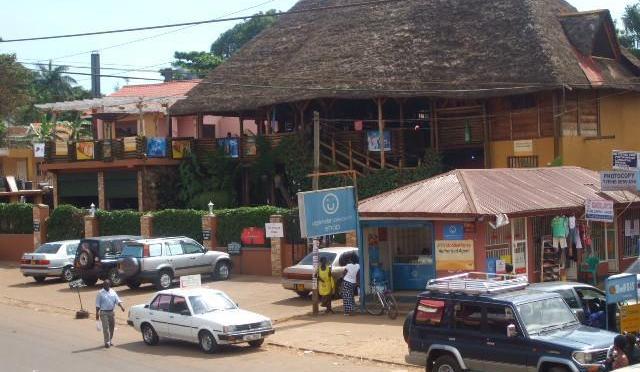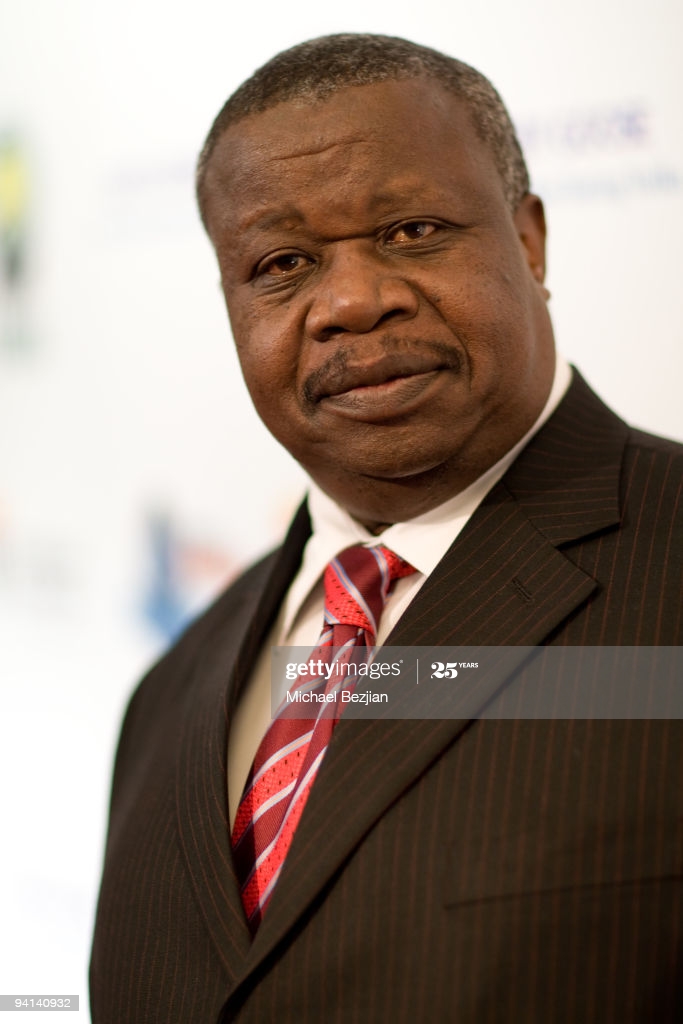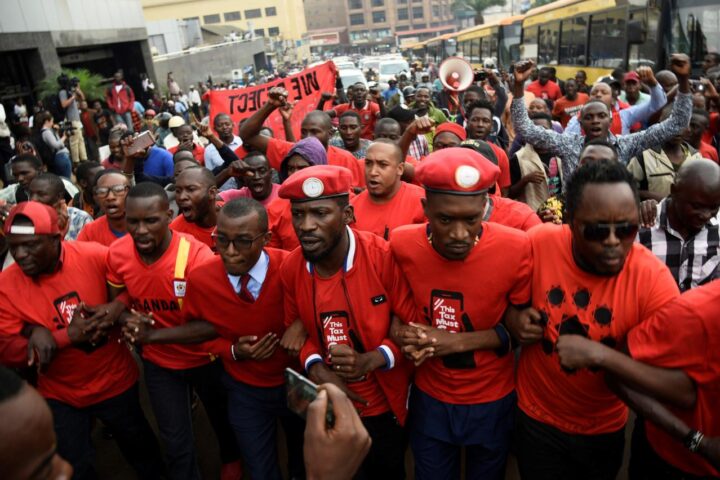A man of the people
Gen. Kahinda Otafiire was huffing and puffing down the stairs. For a man of his weight he moved quite quickly almost tumbling down the three flights of stairs that brought you down from the studios of KFM past the management floor, and two editorial floors into the parking lot. The building was not well designed and perhaps should have been fitted with a lift. It was probably cost cutting that explains its poor design. However, when it was still new – the purpose-built radio studios on top of the Monitor Publications Headquarters were still state of the art. Inside both the newspaper and the radio was one of Uganda’s grinding mills of contemporary political elbowing and clawing. Each day as the press goes to the street and the radio pauses its news and current affairs programs a new layer of events would be pasted on the previous day’s crisis, week after week, year after year.
On this occasion I was escorting Gen. Otafiire downstairs after Andrew Mwenda Live, the flagship political show that I was co-producing.
I say co-producing because Mwenda was a full-time producer himself and threw himself into perfecting the show, from the very start, with OCD punctiliousness. What this meant in practice for a weekly show, often with intense subjects, was akin to offering a second opinion or filling in with show ideas when the political temperature in the country, in a particular week, was lukewarm. A substantial part of the job was being ready to reduce big stacks of information into talking points that supported arguments on either side of an issue. While becoming an overnight expert on the various subjects, interests and personalities was after a few months a matter of course, it was the show’s ambition that set it apart in the building.
At its height it provided the main entertainment – as well as source for lead stories for the newspaper. I was particularly happy as I must have been when walking down luminaries to the car park to observe that the newsroom which would still be nearly full at 8:00 when the show ended – had been tuned to the day’s offer.
Otafiire was always a great guest.
As honest as a ton boy from Aliwara, he was able to shake off grave contradictions at the heart of NRM’s succession politics with something between a stand-up comedy act and a lively realism about what was at stake. Beyond his gluttonous exterior, which he sometimes took part in mocking, Gen Otafiire was a rock-solid operator, a war-time general, spy and one of the soldier-politicians to which the phrase was not spurious praise. I did not encounter him often personally but was present several times to observe him deftly deflect serious crises and survive. On this occasion he had just supported a wide inquiry into the NSSF purchase of land from Security Minister and NRM Secretary General at the time Hon. Amama Mbabazi. “Mbabazi fired the first shot” he said when I pressed him as to what was really behind the affair which was would go to dominate the headlines for weeks. I was being duplicitous myself in fact.
Before the Temangalo revelations I had a meeting with a retired Corporate PR practitioner who played golf with Jim Muhwezi who had told me to look into the NRM party constitution – because Jim and others did not believe that Mbabazi should hold two positions – as Secretary General and Minister at the same time. It seemed quite obvious that a night of the long knives was afoot – and Otafiire was on one side. It was not uncommon even then for the urbane and serious Mbabazi to be depicted by his colleagues as a pretentious outsider, a non-soldier, someone disconnected from ordinary people. Mbabazi wielded the bureaucracy pretty well – and the irony was that his detractors spoke of efficiency as something akin to having less bureaucracy and more emotion into the affairs of NRM and saw this as progress.
Back to him later.
Class, entertainment and politics
The main point of including Otafiire here is that he was always that Minister one could have a beer with. Before I had met him in person, he was a known presence in Middle East in Bugolobi where he would stop for a drink. This was still in the days that pre-dated Kiiza Besigye’s defection from the Movement. As a great conversationalist, who gave as much argument as insult when needed, Otafiire was lingering evidence of how grounded some NRM historicals were. Even as they grew wealthier and more isolated, he could be found on a bench and stool with beer and smoke, in plain sight in a place renown as one of the great watering holes in the city.

Middle East was named after the feuding officers and men of the Uganda Army – but the main source of its cultural life was the Bugolobi Flats which was the closest to a gated community from the 80’s. Some members of the First Family begun their social careers in the flats which was a host to many professional families and civil servants. My family lived at the very end of the flats. From my kitchen window I could see Mike Mukula’s “White House” and Godfrey Nyakana’s home later. The Middle East market by the early 90’s had spilled into new bars and drinking spots on both sides – the most famous of which was Bamboo Nest. The lockups ( shops during the day that would serve alcohol to friends and their friends at Sundown were essential networking spots and offered many people a chance to keep in touch with the upwardly mobile NRM crowd.
More can be said about Middle East, but it is perhaps because this part of the city remained dominated by professional families packed into the flats and adjacent Bungalows that the drinking scene in the market area did not become like Kabalagala-Kasanga. Even today with second generation settlers in the flats – which is now fully gated, and with more posh bars, shops and a mall – the area maintains a veneer of cosmopolitan sophistication – where the drinking still continues until the economy or politics improves. Many people have pointed out that the social economy is suffering as much as the actual economy from the bar closures, but one reason could very well be that very few Otafiires can now be found drinking with commoners.
Exclusiveness has long become the refuge of privilege for most of his class.
Around Kampala there are now not just bars but even larger more expensive facilities often identifiable by the type of soldiers guarding the entrance – that depict the class differences. While Museveni has been admonishing his peers and criticizing the drinking of alcohol, the real tragedy here is not that he is right about the potential problems substance abuse pose, but that he too is isolated, lately in a biological bunker, within which it must seem straightforward to continue to keep wayward businesses closed.
According to the Legit Bar, Entertainment and Restaurant Owner’s Association, a lobby group for registered bars and night clubs, their 60 thousand members employ nearly 2 million people, majority of who are waiting staff, barmen and cashiers, cleaners, parking guides, chefs, bouncers etc. That is a lot of people who have been without their jobs or if they are coping – are using Luwero methods to continue serving paying clientele.
Some are embracing technology and catering to small exclusive groups of 50. But this cannot support the large industry that relies on alcohol and entertainment.
That the plight of such a vast scope of employment ( multiply the directly employed with 5 – to cater for family members who may depend on that income) and one can see just how great the burden is that has been imposed on a section of Ugandans. ( see presentation for their case)
This of course is not about COVID – as many of these businesses can be re-opened with SOPs ( Standard Operating Procedures) whose operations will likely be safer than riding in a matatu today. The moral arguments against reopening the bars and so forth are not without merit but the continued closure is a nuclear option.
Morality, class and politics are in friction here. After all an entertainer, someone who has been disparaged as a drunk, a ganja planter, has become the political nemesis of the establishment class maybe. Before we bring in the ghetto into this debate we shall return to the colorful former political commissar of the army – Kahinda Otafiire.
Up next – in an earlier encounter, I was serving tea and coffee in the studio, when I heard him deny having stolen even a twig from the DRC. I was flummoxed of course having only just arrived from the streets myself into journalism. Anyone who operated on William, Luwuum Streets or went by the Post Office building – knew this was a big lie.
But he told it well.







